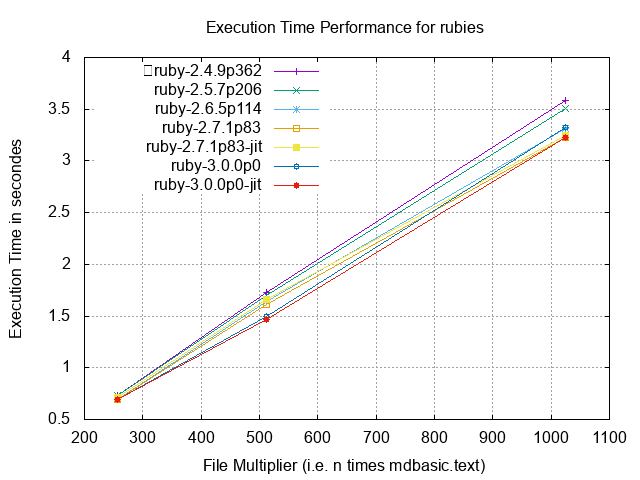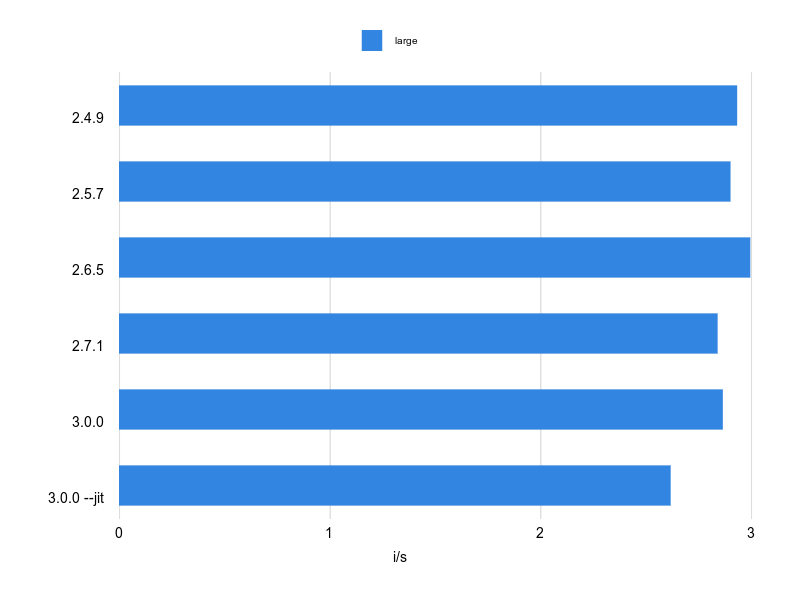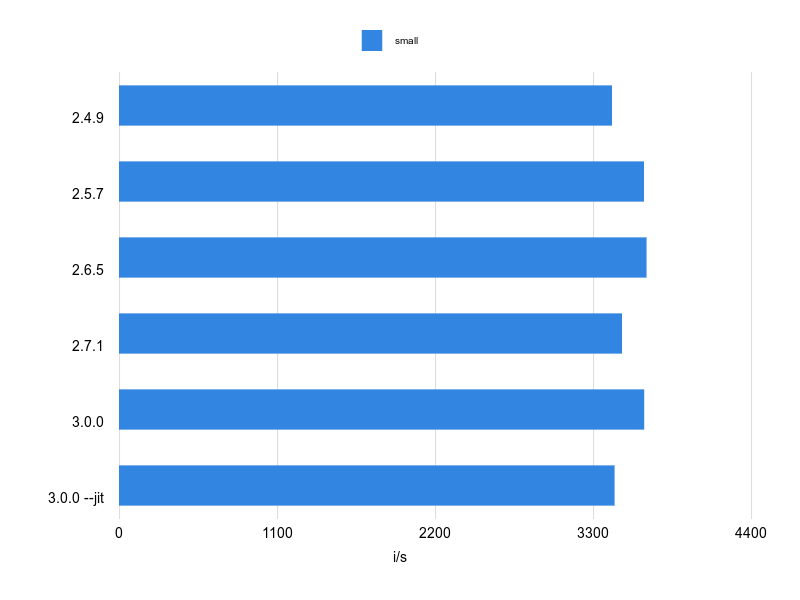Benchmarking Ruby 2.4 to 3.0
Benchmarking Ruby version with three different benchmarks
I ran some benchmarks using HexaPDF after Ruby 2.4 was released in 2016 and again after Ruby 2.5 was releasd in 2017. Since Ruby 3.0.0 was released this Christmas, I think this warrants another round of benchmarks. And this time three different real-world benchmarks are used to evaluate relative Ruby performance.
Three Real-world Benchmarks
The last two times I just used HexaPDF to evaluate the relative performance of Ruby releases. This time I will use three different Rubygems for this task:
-
HexaPDF Benchmarks
What once started as simple gists is now part of the HexaPDF repository. The benchmark descriptions are available on the HexaPDF website. I recommend looking at the descriptions there to understand what the benchmarks do as I will not replicate the descriptions here.
The following commands were excecuted in the
benchmark/directory:./rubies.sh "2.4.9 2.5.7 2.6.5 2.7.1 3.0.0 3.0.0j" optimization -b hexapdf ./rubies.sh "2.4.9 2.5.7 2.6.5 2.7.1 3.0.0 3.0.0j" raw_text -b hexapdf ./rubies.sh "2.4.9 2.5.7 2.6.5 2.7.1 3.0.0 3.0.0j" line_wrapping -b hexapdfA Ruby version with an appended “j” tells the script to activate the JIT.
-
kramdown Benchmark
kramdown also includes a simple benchmarking script which is normally used for evaluating the performance of different kramdown versions. I added another script to facilitate testing of a single kramdown version on different Ruby versions.
The benchmark just parses and converts a sample Markdown input document. The size of the input document is increased for each run (i.e. the original input document is just concatenated X times).
You can run the benchmark yourself in the kramdown repository using the
benchmark/benchmark-rubies.shscript which needs rbenv and gnuplot installed as well as the kramdown gem in therbenv shell --unsetenvironment.The following command was used:
/benchmark/benchmark-rubies.sh "2.4.9 2.5.7 2.6.5 2.7.1 2.7.1j 3.0.0 3.0.0j"A Ruby version with an appended “j” tells the script to activate the JIT.
-
geom2d Benchmark
geom2d is a small library for 2D geometry. It includes an algorithm for boolean operations (think union, intersection, …) on arbitrary polygons. The benchmark intersects polygons – one set has just a few vertices, the other many – which is a compute-intensive operation. So I would expect a speed-up when using the JIT here.
This benchmark is done using the superb benchmark-driver gem.
Results and Comments
All benchmarks were done on Ubuntu 20.04 with an i7-8550U processor.
HexaPDF
The images are SVG files, click on them to open them in a new window to view details. The raw data is already the post-processed data ready for gnuplot-ingestion, with the time in milliseconds and the memory in kilobytes.
Optimization Benchmark
Note: There are six groups (different files a.pdf to f.pdf) of four benchmarks (different
hexapdf invocations; except for f.pdf which only has three because the CSP mode would take
really long) with each benchmark having six columns (different Ruby versions).
Time "hexapdf 2.4.9" "hexapdf 2.5.7" "hexapdf 2.6.5" "hexapdf 2.7.1" "hexapdf 3.0.0" "hexapdf 3.0.0-jit"
"a.pdf" 148 189 200 227 177 512
"C a.pdf" 141 154 152 155 157 456
"CS a.pdf" 138 143 159 157 162 441
"CSP a.pdf" 159 155 188 183 177 452
"b.pdf" 710 627 653 660 688 1069
"C b.pdf" 701 641 672 733 714 1058
"CS b.pdf" 797 723 762 788 806 1063
"CSP b.pdf" 4430 4385 4582 4573 4823 5205
"c.pdf" 1227 1224 1233 1206 1303 1571
"C c.pdf" 1308 1257 1307 1358 1407 1689
"CS c.pdf" 1461 1408 1402 1446 1515 1746
"CSP c.pdf" 4674 4823 5010 5138 5308 5993
"d.pdf" 3439 2973 2984 2873 3296 3672
"C d.pdf" 3372 2875 2957 2862 3029 3725
"CS d.pdf" 3789 3234 3277 3109 3510 4213
"CSP d.pdf" 3801 3370 3484 3150 3557 4254
"e.pdf" 687 611 641 571 601 785
"C e.pdf" 737 694 699 696 759 1016
"CS e.pdf" 770 723 738 755 757 1065
"CSP e.pdf" 17650 18082 18140 18897 19324 0
"f.pdf" 44039 0 36400 35459 33779 37168 39065
"C f.pdf" 48286 39558 39627 40512 42744 42474
"CS f.pdf" 54120 47982 45595 46055 48131 49231
Memory "hexapdf 2.4.9" "hexapdf 2.5.7" "hexapdf 2.6.5" "hexapdf 2.7.1" "hexapdf 3.0.0" "hexapdf 3.0.0-jit"
"a.pdf" 15480 15292 19404 28540 27284 43896
"C a.pdf" 15624 15240 19428 28332 27552 44408
"CS a.pdf" 15924 15720 19744 28708 27636 44344
"CSP a.pdf" 16172 16312 20824 29244 27968 44420
"b.pdf" 35308 34452 35944 46072 45180 57484
"C b.pdf" 35184 34480 35304 46236 45648 57384
"CS b.pdf" 35256 37456 36020 48068 48264 57448
"CSP b.pdf" 55608 48204 47156 57172 58824 59900
"c.pdf" 40568 34652 43412 51816 47856 57480
"C c.pdf" 42560 37588 38348 50116 49644 57328
"CS c.pdf" 44892 39936 41328 52052 51756 57508
"CSP c.pdf" 70560 59576 54672 66208 65900 67680
"d.pdf" 62144 65920 70084 76028 76336 76980
"C d.pdf" 61860 57788 64076 77260 73856 74396
"CS d.pdf" 63356 57284 64276 79816 74436 74344
"CSP d.pdf" 87832 75504 82328 99620 88016 89080
"e.pdf" 45868 51308 48000 54892 55444 55656
"C e.pdf" 100856 69980 75440 98592 102932 94516
"CS e.pdf" 100260 69748 74024 95260 100696 101788
"CSP e.pdf" 197016 176820 128996 151168 152404 0
"f.pdf" 489868 0 490452 498336 471948 472380 472804
"C f.pdf" 506684 504776 486748 528316 529732 537968
"CS f.pdf" 608280 596416 567020 595480 609728 601932
Raw Text Benchmark
Time "hexapdf 2.4.9" "hexapdf 2.5.7" "hexapdf 2.6.5" "hexapdf 2.7.1" "hexapdf 3.0.0" "hexapdf 3.0.0-jit"
"1x" 479 465 496 511 566 784
"5x" 1809 1830 1868 1913 2021 2278
"10x" 3531 3434 3600 3765 4002 5255
"1x ttf" 544 613 599 594 629 942
"5x ttf" 2222 2389 2268 2290 2482 2981
"10x ttf" 4479 4552 4563 4638 4851 5501
Memory "hexapdf 2.4.9" "hexapdf 2.5.7" "hexapdf 2.6.5" "hexapdf 2.7.1" "hexapdf 3.0.0" "hexapdf 3.0.0-jit"
"1x" 30152 24316 26232 35520 34056 46840
"5x" 57544 36876 38608 45864 45368 55020
"10x" 77372 49840 49668 58012 57112 68320
"1x ttf" 26932 23880 24872 33752 33232 46868
"5x ttf" 59996 42572 40920 48856 48820 49588
"10x ttf" 80584 60372 55132 62728 63688 68268
Line Wrapping Benchmark
Time "hexapdf 2.4.9" "hexapdf 2.5.7" "hexapdf 2.6.5" "hexapdf 2.7.1" "hexapdf 3.0.0" "hexapdf 3.0.0-jit"
"L 400" 1210 1219 1265 1331 1330 1703
"C 400" 1519 1581 1577 1693 1506 1848
"L 200" 1357 1344 1411 1480 1494 1744
"C 200" 1772 1869 1851 1877 1658 1948
"L 100" 1628 1617 1560 1758 1676 1856
"C 100" 2098 2077 2058 2217 2001 2310
"L 50" 2901 2787 2762 2806 2733 3172
"C 50" 3561 3461 3483 3616 3387 3903
"L 400 ttf" 1300 1376 1411 1436 1426 1933
"C 400 ttf" 1628 1700 1759 1729 1733 1898
"L 200 ttf" 1588 1525 1552 1589 1783 1923
"C 200 ttf" 1864 1892 1971 1979 1816 2178
"L 100 ttf" 1888 1833 1872 1859 1897 2288
"C 100 ttf" 2423 2420 2507 2404 2235 2805
"L 50 ttf" 5100 4845 5015 4947 4937 5574
"C 50 ttf" 6104 5946 6272 5904 5571 6493
Memory "hexapdf 2.4.9" "hexapdf 2.5.7" "hexapdf 2.6.5" "hexapdf 2.7.1" "hexapdf 3.0.0" "hexapdf 3.0.0-jit"
"L 400" 84676 77912 83476 91672 100696 101928
"C 400" 85112 80204 83344 96848 108756 109564
"L 200" 86144 74900 93812 104136 92736 93284
"C 200" 83552 80696 81436 91616 100940 101508
"L 100" 83048 74040 91552 98792 89744 90268
"C 100" 83568 76772 80712 90464 96956 97828
"L 50" 200188 179200 155004 193996 189788 207156
"C 50" 199416 174324 161544 186052 231444 221180
"L 400 ttf" 81296 79572 96844 100784 91120 92108
"C 400 ttf" 78544 82332 92356 103460 108152 108688
"L 200 ttf" 88684 85288 90144 92304 85732 86112
"C 200 ttf" 76960 89232 87568 96148 98860 99280
"L 100 ttf" 79764 84788 87452 92336 86368 87404
"C 100 ttf" 80820 88760 85492 95368 96608 97268
"L 50 ttf" 257716 270368 236536 286000 281968 284932
"C 50 ttf" 259612 291688 252096 282292 286640 284348
Comments
-
Run time for all Rubies except Ruby 3.0.0+JIT is roughly the same, with 3.0.0+JIT being much slower in nearly all cases.
-
Memory usage (see raw data) generally got better from 2.4 to 2.5 but got worse starting with 2.7 and takes another hit when the JIT is used.
-
One interesting thing is that Ruby 3.0.0+JIT errors out when doing the “hexapdf CSP” optimization benchmark on the
e.pdffile. I will have to look at this to see what is happening there.
kramdown

# ruby-2.4.9p362 || ruby-2.5.7p206 || ruby-2.6.5p114 || ruby-2.7.1p83 || ruby-2.7.1p83-jit || ruby-3.0.0p0 || ruby-3.0.0p0-jit
256 0.73670 0.72830 0.69474 0.69346 0.70838 0.69294 0.69133
512 1.72586 1.70017 1.64458 1.61140 1.65583 1.49876 1.46554
1024 3.58049 3.50635 3.31272 3.22631 3.25020 3.32012 3.23109
The general trend here is that Ruby got faster over time, with Ruby 2.7 and 3.0 being roughly the same, irrespective of JIT usage.
geom2d
The bars represent instructions per seconds, so larger bars are better.


Comparison:
large
2.6.5: 3.0 i/s
2.4.9: 2.9 i/s - 1.02x slower
2.5.7: 2.9 i/s - 1.03x slower
3.0.0: 2.9 i/s - 1.05x slower
2.7.1: 2.8 i/s - 1.05x slower
3.0.0 --jit: 2.6 i/s - 1.14x slower
small
2.6.5: 3813.9 i/s
3.0.0: 3797.3 i/s - 1.00x slower
2.5.7: 3794.6 i/s - 1.01x slower
2.7.1: 3635.5 i/s - 1.05x slower
3.0.0 --jit: 3582.3 i/s - 1.06x slower
2.4.9: 3562.4 i/s - 1.07x slower
I expected that Ruby 3.0.0+JIT would perform best in this benchmark because it is largely CPU-bound. However, it was actually one of the slowest Rubies.
Conclusion
Ruby 3.0.0 brings many new things to the table with respect to concurrency and typing. If we look at strictly CPU-bound applications it also got much better performance, especially with the JIT.
However, for real world applications the performance increases are evolutionary rather than revolutionary. Those who follow Ruby development have known this for years. And I think that is okay because Ruby is already acceptably fast in many cases (e.g. the HexaPDF PDF library being only 50%-90% slower than a PDF library written in C++).